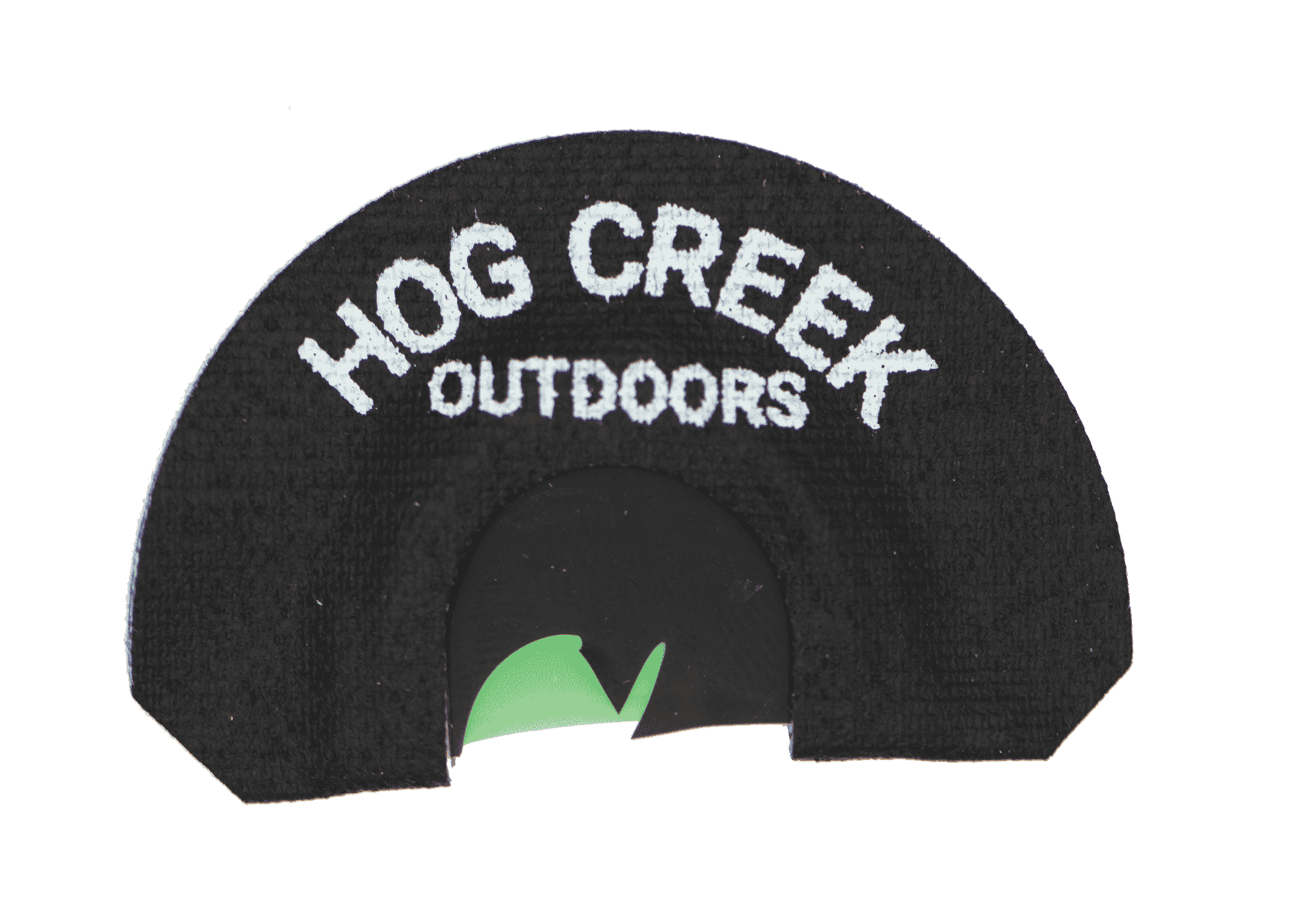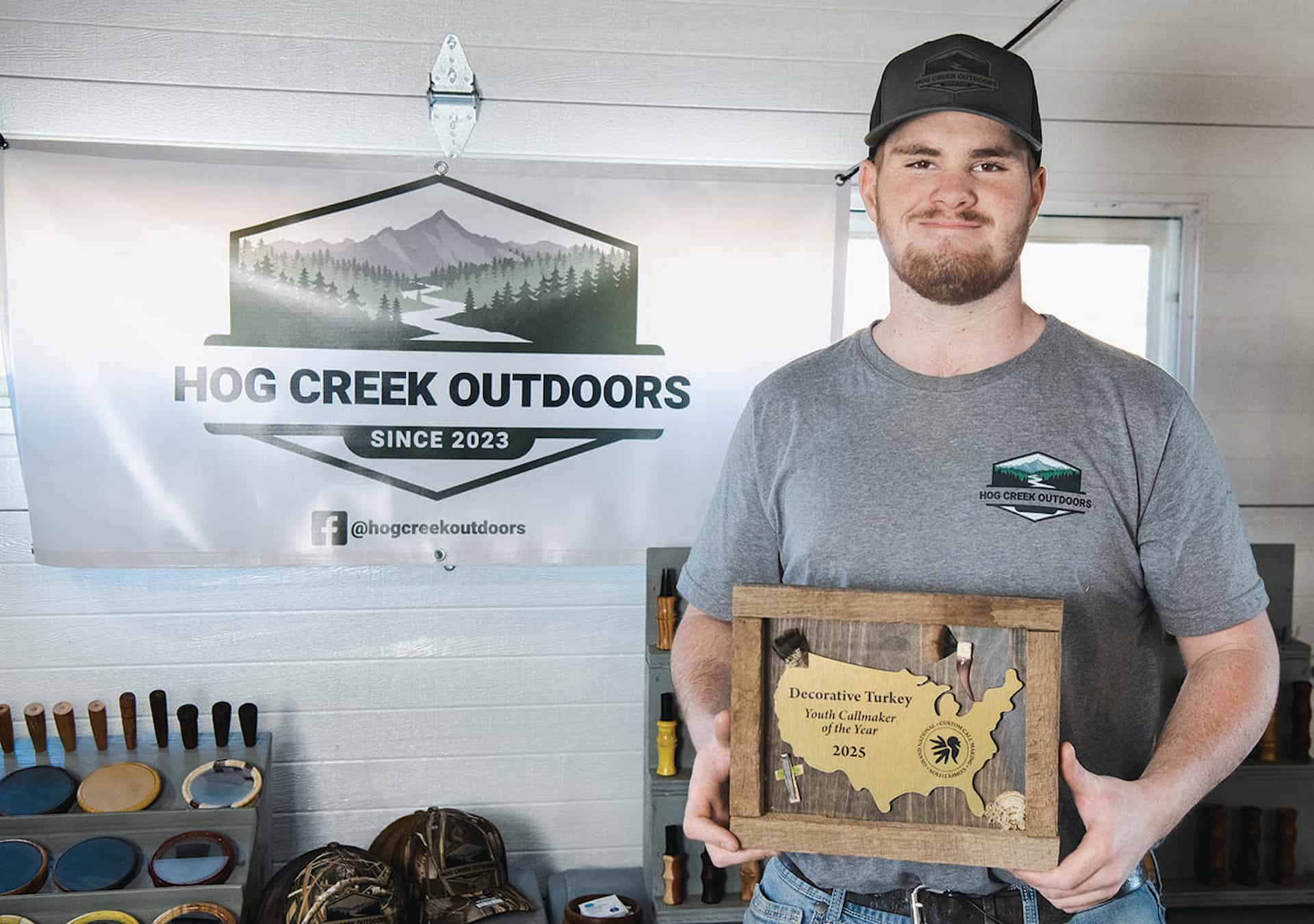The call of success
Story and photos by Emily Kummerfeld
Talented teenager turns passion for hunting into prize-winning craft
At first glance, 17-year-old Cash Koch is a typical teenager growing up in rural America. He lives with his parents on a farm outside Houston, Mo., where he helps his dad, Eryc, raise cattle and produce hay and is homeschooled by his mom, Megan.
A distinctive difference between Cash and other teens, however, is his incredible talent for making custom wooden game calls. It’s a skill that has captured widespread acclaim. This past February, Cash was recognized as the Youth Decorative Turkey Call Maker of the Year at the National Wild Turkey Federation’s (NWTF) Grand National Custom Callmaking Competition in Nashville. Additionally, he won first place for Best Overall Presentation for a crow call designed to resemble a morel mushroom, and third place in the Matched Set/Multiple Calls category for a carved wooden shotgun that included a crow call, owl hooter and turkey slate call with striker all in one.
In a competition with around 1,400 entries, these are exceptional accomplishments. For Cash, the acknowledgment is even more meaningful since he is primarily self-taught in the craft of callmaking, lacking any official woodworking education or parental guidance.
 Megan said she often wonders where her son gets his talent, as neither she nor Eryc is very crafty. “Most youth call makers who win have a dad who is a call maker,” she said. “So, it’s unusual that Cash has won. He hasn’t had anyone show him how to do it.”
Megan said she often wonders where her son gets his talent, as neither she nor Eryc is very crafty. “Most youth call makers who win have a dad who is a call maker,” she said. “So, it’s unusual that Cash has won. He hasn’t had anyone show him how to do it.”
Like most of his callmaking peers, Cash’s passion is rooted in a love for the outdoors. He started hunting around the age of 7, and turkey hunting soon became his favorite.
At 13, he ventured into crafting his own sportsman’s gear by making bucktail jigs for fishing, which led to handmaking both soft plastic and wooden fishing lures and tying flies. With new confidence in his artisanal abilities, Cash next wanted to try his hand at making a turkey pot call. This type of friction call allows a hunter to mimic turkey sounds and consists of a shallow, wooden pot (or cup) with a slate, glass or crystal surface and a striker tool, also typically made of wood. When the striker hits the pot surface material, the resulting sound is similar to the vocalizations of a hen turkey, such as a yelp or a cluck.
But to make a polished turkey pot call capable of calling in a trophy tom, Cash needed a piece of heavy machinery called a lathe that could rotate and trim the wood into the desired round shape. As luck would have it, Cash’s neighbor had an old Craftsman lathe that he would exchange with the young man for dog-sitting services.
“I ended up making my first call on that 50- or 60-year-old Craftsman lathe,” said Cash, who also taught himself how to use the machine.
That first turkey call was a cedar glass-over-slate pot call, which Cash crafted without following any formal design. “It was all just kind of eyeballing from looking at other calls,” he said. “But it did not sound good.”
While the sound may have been disappointing, Cash was undeterred. He continued honing his skills and expanded beyond pot calls to create latex diaphragm (or mouth) calls, grunt calls, crow calls, owl hooters, squirrel calls and prey distress calls.
For the most part, Cash learned on his own with some help from a fellow call maker who lives several hours away. Most of that assistance was over the phone.
“He just calls and says, ‘What am I doing wrong?’” Megan said.
 Like any champion, winning takes countless hours of practice, and Cash is no exception. Honing his callmaking skills meant “a lot of error and a lot of trial,” he said. Yet, in just a few short years, Cash now has the process down to a science, particularly when crafting pot calls.
Like any champion, winning takes countless hours of practice, and Cash is no exception. Honing his callmaking skills meant “a lot of error and a lot of trial,” he said. Yet, in just a few short years, Cash now has the process down to a science, particularly when crafting pot calls.
He first chooses the wood he would like to work with, often favoring domestic hardwoods such as walnut or cherry. Cash next cuts a smaller piece of the wood on his miter saw, and then mounts that piece on the lathe to turn it into the shape of the call. In the final steps, he finishes and seals it, drills holes on the bottom, wood-burns it, and then glues on either glass or slate for the strike pad.
“The glass gives you just a little bit of a different sound than slate,” he explained.
Next, using various striker models, Cash determines which style produces the best sound for each new call, and he creates a copy of that striker to accompany it.
But for Cash, the last step is the most important and determines the pot call’s ultimate worth. “You take the call, and you go kill a turkey,” he said.
A successful hunt with a call produced by his own handiwork drives Cash’s passion. “It’s a great feeling,” he said. “I don’t know how to explain it, but it feels a lot better than just using a call I’ve bought somewhere.”
It’s also an achievement he seeks to share with other hunters. Cash created his own business, Hog Creek Outdoors, to sell his game calls and bucktail jigs online. He also donates many of his handcrafted pieces to charity auctions.
“I really like making a good product that other hunters can be successful with,” Cash said.
To date, he has made more than 300 turkey calls, including his favorite call of all time, a slate pot call, which he used last turkey season. “Between myself and taking other people hunting, I called in five turkeys that we killed,” Cash said proudly.
Now with the NWTF competition over, Cash has big plans for the rest of the year. He’s looking forward to the upcoming turkey season and new opportunities to grow his business.
“I’m trying to work on making better calls,” he said. “I’d also like to set up at gun shows and try to sell my calls.”
Not surprisingly, Cash plans to enter the NWTF callmaking contest again next year. “I already have ideas for 2026,” he said, adding that those ideas will be kept secret for now.
Next year, Cash will be a senior in high school. After graduating, he plans to keep making calls, growing his business and maybe continuing the family’s farming tradition.
“I’d like to farm. I really enjoy it—just everything about it,” said Cash, who has been a familiar face at the Houston MFA Agri Services since he was a baby. He’s also raised his own calves since he was 6 years old in addition to helping with the Kochs’ 60-head cow/calf operation.
Whatever the future may hold, Cash will undoubtedly accomplish it with the same hard work and unwavering determination he’s developed as a champion call maker. Achieving success is simple, he said:
“Don’t quit. If I’m stuck building calls and can’t get something figured out, I never stop. I just keep trying something different until it works.”
To learn more about Cash’s business and available items for sale, visit hogcreekoutdoors.com.
***
CLICK HERE for more articles from this April/May Today's Farmer.
To view the article as printed with all of the photographs CLICK HERE.